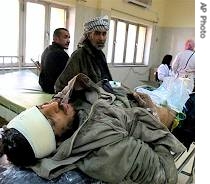-
(单词翻译:双击或拖选)
By Michael Bowman
Washington
24 December 2006
Roadside bombs and sectarian violence have claimed the lives of at least 11 Iraqi security force members and three U.S. soldiers in various parts of the country. VOA's Michael Bowman reports from Washington, the continued violence comes as American legislators debate whether President Bush should send more U.S. troops to Iraq.

Iraqi man injured in a roadside bomb blast lies in a bed in Baghdad's Kindi hospital, 24 Dec 2006
A roadside bomb killed three American soldiers and wounded another in Baghdad. U.S. military sources say the explosion struck the soldiers' vehicle as it was traveling in the eastern part of the city.
Elsewhere, a suicide bomber1 killed seven Iraqi policemen and wounded dozens of others at a police station northeast of Baghdad. At least four Iraqi security force members were also killed in clashes with militiamen in the southern city of Samawa.
Meanwhile, scores of bodies, many showing signs of torture, have been found in Baghdad and elsewhere in the country.
Continued violence and sectarian strife2 have led President Bush to reassess U.S. strategy in Iraq. Mr. Bush has promised to unveil a new plan next month. Among the options believed to be under consideration is an increase in U.S. troops deployed3 to Iraq, an idea that has the support of Republican Senator Lindsay Graham of South Carolina, who sits on the Armed Services Committee.
"The security environment in Baghdad is very much deteriorated4. You are not going to have a political solution [in Iraq] with this much violence, so a surge of troops is, I think, very necessary," said Graham. "Political reform without additional combat capability5 is not going to lead to a successful outcome in Iraq. If you want to win, you need more combat capability. We have never had enough troops to begin with. We have paid a price for that."
The senator spoke6 on ABC's This Week television program. Also appearing on the program was Senator Christopher Dodd. The Connecticut Democrat7, who sits on the Foreign Relations Committee, recently returned from a trip to Iraq and said he opposes sending more U.S. troops.
"The commanders I talked to last week, and soldiers on the ground, felt that a surge in troops of 15,000 to 30,000 additional troops was not going to contribute to the diplomatic solution that Iraq cries out for," he said. "I do not see any mission associated with this [proposal]. It sounds to me like a tactic8 in search of a strategy. Adding as many as 30,000 troops to the Baghdad would be a mistake and cause us even more difficulty down the road."
Last week, President Bush admitted that the United States is not winning in Iraq. The president added, however, that he remains9 committed to the goal of fostering democracy in Iraq, and that he is considering all options for bringing about a favorable outcome.
 收听单词发音
收听单词发音
1
bomber

|
|
| n.轰炸机,投弹手,投掷炸弹者 | |
参考例句: |
|
|
|
2
strife

|
|
| n.争吵,冲突,倾轧,竞争 | |
参考例句: |
|
|
|
3
deployed

|
|
| (尤指军事行动)使展开( deploy的过去式和过去分词 ); 施展; 部署; 有效地利用 | |
参考例句: |
|
|
|
4
deteriorated

|
|
| 恶化,变坏( deteriorate的过去式和过去分词 ) | |
参考例句: |
|
|
|
5
capability

|
|
| n.能力;才能;(pl)可发展的能力或特性等 | |
参考例句: |
|
|
|
6
spoke

|
|
| n.(车轮的)辐条;轮辐;破坏某人的计划;阻挠某人的行动 v.讲,谈(speak的过去式);说;演说;从某种观点来说 | |
参考例句: |
|
|
|
7
democrat

|
|
| n.民主主义者,民主人士;民主党党员 | |
参考例句: |
|
|
|
8
tactic

|
|
| n.战略,策略;adj.战术的,有策略的 | |
参考例句: |
|
|
|
9
remains

|
|
| n.剩余物,残留物;遗体,遗迹 | |
参考例句: |
|
|
|















